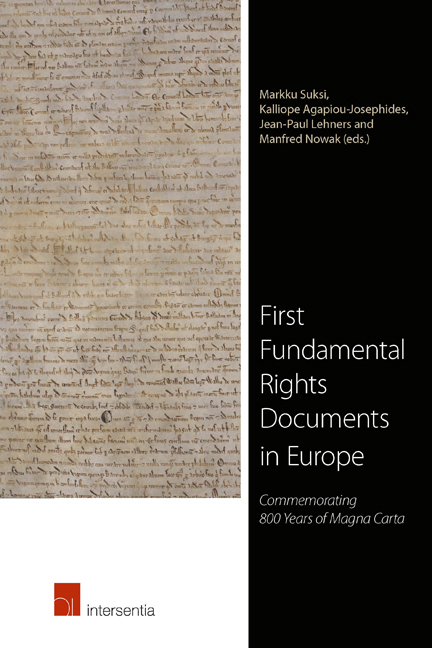Book contents
- Frontmatter
- Preface
- Contents
- List of Authors
- 1 Introduction
- PART I
- 2 The United Kingdom: From Magna Carta 1215 to the Rule of Law
- 3 Ireland: Individual and Group Rights in Ancient Irish Law
- 4 Italy: The Liber Paradisus — A Vision of Good Governance
- 5 Hungary: The Historic Constitution as the Place of Memory
- 6 Belgium: From Collective Privileges to Individual Rights
- 7 Austria: Manorial Regulation of Mining and Use of Forests as Potential Antecedents in Fundamental Rights
- 8 Spain: The First Cry for Justice in the Americas — From Antonio de Montesinos to the Laws of Burgos (1512)
- 9 Lithuania: From Equality to Inequality and to Equality Again
- 10 Poland: From the Golden Liberty of the Nobles to Fundamental Rights
- PART II
- Index
8 - Spain: The First Cry for Justice in the Americas — From Antonio de Montesinos to the Laws of Burgos (1512)
from PART I
Published online by Cambridge University Press: 15 December 2017
- Frontmatter
- Preface
- Contents
- List of Authors
- 1 Introduction
- PART I
- 2 The United Kingdom: From Magna Carta 1215 to the Rule of Law
- 3 Ireland: Individual and Group Rights in Ancient Irish Law
- 4 Italy: The Liber Paradisus — A Vision of Good Governance
- 5 Hungary: The Historic Constitution as the Place of Memory
- 6 Belgium: From Collective Privileges to Individual Rights
- 7 Austria: Manorial Regulation of Mining and Use of Forests as Potential Antecedents in Fundamental Rights
- 8 Spain: The First Cry for Justice in the Americas — From Antonio de Montesinos to the Laws of Burgos (1512)
- 9 Lithuania: From Equality to Inequality and to Equality Again
- 10 Poland: From the Golden Liberty of the Nobles to Fundamental Rights
- PART II
- Index
Summary
INTRODUCTION
Although it is always a risky intellectual exercise to judge past events and legal developments by contemporary categories and paradigms, it can be argued that one of the first attempts in Spain to protect human dignity took place in the context of the encounter with the New World. The Spanish Conquest of the Americas after 1492 and the debate about the treatment to be given to the Indians paved the way for a very passionate and challenging discussion as to both the nature of indigenous people and the duties of the conquistadores towards them. Against this background, Antonio de Montesinos, a Dominican friar sent to the Americas to accompany the conquerors and to guarantee that Catholic principles would lead the colonial enterprise, preached a revolutionary sermon in 1511 that shocked the conscience of both the conquistadores and the Spanish Crown. He openly denounced the unjust ill-treatment that the Indians were suffering. This sermon had a profound impact in imperial Spain, and moved the King to convene an official discussion of theologians and jurists that led to the adoption of the Laws of Burgos on 27 December 1512, whose main goal was to protect and humanise the Indians and to regulate the rights and duties of the conquistadores. The aim of this chapter is to analyse the religious and philosophical climate in which these Laws were adopted, and to explore to what extent they can be considered an early proclamation of fundamental rights.
THE SERMON BY ANTONIO DE MONTESINOS
On the Sunday before Christmas in 1511 Dominican Father Antonio de Montesinos delivered a highly provocative sermon in the Holy Mass in Isla Española (today's Dominican Republic and Haiti), the first colonial town erected in the New World after the Spanish Conquest. The content of the sermon had been agreed by the whole group of Dominicans, the Order of Preachers, and its principal aim was to publicly protest against the treatment the Indians were receiving. As Lewis Hanke has underlined, this sermon can be seen as ‘the first cry on behalf of human liberty in the New World’.
- Type
- Chapter
- Information
- First Fundamental Rights Documents in EuropeCommemorating 800 Years of Magna Carta, pp. 93 - 106Publisher: IntersentiaPrint publication year: 2015



